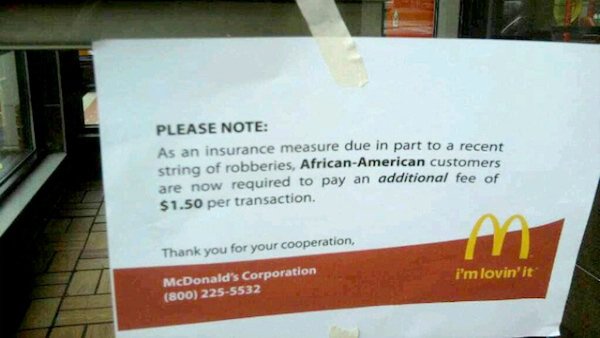Ideas that lock in lasting connections
Monthly Archives: June 2011
Bluffers out to burn McDonalds’ buns helps marketing catch a virus
Isn’t the PR firestorm McDonalds has been fighting over the last few days revealing?
A now-removed photo uploaded on Twitter went viral last weekend (see below). Showing a purported communiqué in the window of a Golden Arches eatery, the bulletin announced that African-Americans would now be charged an extra $1.50 “as an insurance measure due in part to a recent string of robberies”.
Clearly fake, right? But why sacrifice a good wheeze on the altar of the truth, eh?
Twitter found itself as the perfect playground for such winsome horseplay and the ruse spread like wildfire across the Twitterverse.
Repeated denials by Macca D’s PR machine of the pic’s authenticity failed to douse the flames. The outrageous idea of Macca D’s ‘black tax’ had gained traction. The New York Times reckons there’re still people out there who believe it’s true.
You couldn’t make this stuff up, could you?
What does this say about the power of ideas? Does an idea have to be authentic for it to become a contagion? This story, as well as history, tells us no.
Which of course is a sticky wicket for people like me whose trade relies on ideation.
BrandChannel, an on-line commentator on all things branding, wondered why people believe what they want to believe – despite obvious cues to the truth (the note’s freefone number puts callers through to Macca D’s big competitor, KFC…).
Now sure, having caught wind of the prank, people chose to run with it rather than dismiss it. But is this necessarily evidence of ‘belief’ – as if folk were convinced by it or swallowed it as truth? Let’s give people more credit than that, shall we?
Not that I think the world ‘believing’ such a risible yarn is the bigger story here, anyways.
This slice of life lifts the lid on a slither of the human psyche, where conviction conveniently gets trumped by preference and – this is where marketers like me come in – is another wake-up call to the power of Twitter’s economy (if one were needed…).
A huge percentage of social media’s traction is its appeal to the ego. People want to be liked and collect followers like kids collect trading cards. The more followers you have, the more ‘popular’ you are, right? And one way to raise your profile and garner popularity (and ergo kudos) is to jump on a topic that’s trending, say anything that might get retweeted and hopefully pick up a few more followers on the way! Job done.
It’s like fly fishing but without the galoshes. Or the rod. Or the lovingly crafted floating decoy. The juicy tweet is the specious titbit we hope tweeter’s bite on. Only difference is, you get to keep the tweep and wear burgeoning numbers like badges of honour on your profile, rather than throw a fish back! Nifty.
As a marketer, my antidote to the fruitless pretence of the numbers game is to network with folk you actually feel you can give something worthwhile to. Forget putting media before social* and go for quality above quantity. Do that and you might actually make lasting connections that make a real difference to someone’s quality of life – yours included.
Now we could spend a good, long while in Supercilious Towers (where highbrow is really lowbrow), pontificating from on high on where our society is headed when social media currency trumps principle, but let’s not. Too icky, right?
Instead, I’m more interested in the pulling-power of Twitter’s economy, where the perceived value people are so keen to trade in is so compelling, so appealing, that popularity, the lure of the crowd and a splash of tomfoolery is worth more than credibility – or even integrity.
Of course, there’s nothing wrong with Twitter per se. But if you wanted to create a system from scratch that could spread communicable misinformation as swiftly, as widely and as conveniently as this, then you’d have to go some to better Twitter.
So, what’s my best guess as to what really went on here? Tweeters saw the hoax, saw its heat and preferred to smile and warm their booties on it. Rather than put out the flames, they chose to gather round, chuck a bit more on and have fun watching it burn. (Besides, it’s McDonalds. They’re a big ol’ corporation raking it in. No-one’s gonna get hurt, right?!)
Conveniently forgetting the fact that spreading such tall tales might make folk look idiotic.
Or give more skilled media players encouragement to pull more sinister, equally contagious sleights of hand in future.
Unless you think I’m overstating things somewhat…
*with thanks to Danny: @Danny_Fr








Recent Comments